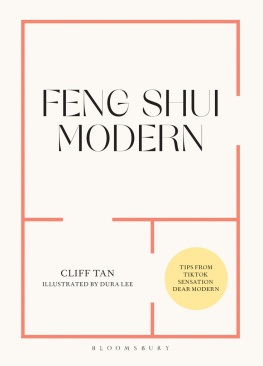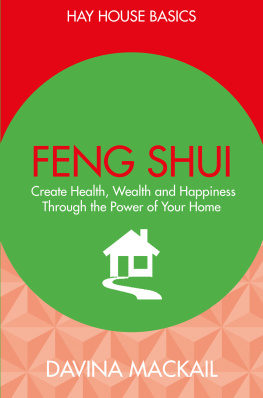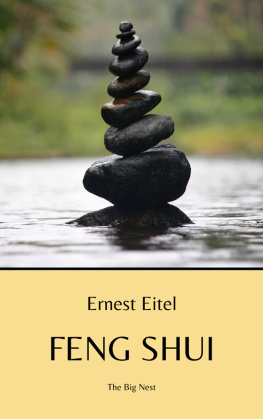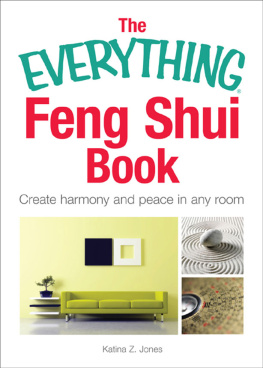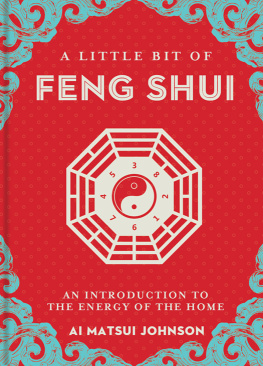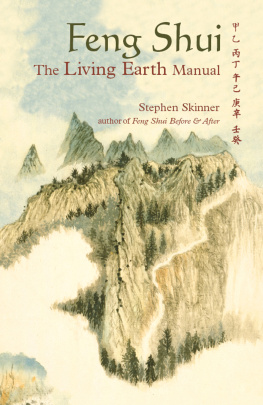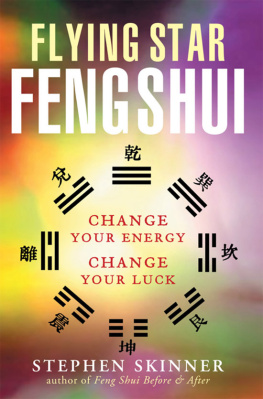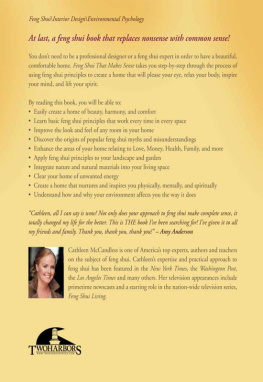

INTRODUCTION
Let me share a little story. Some years ago, my sister bought a new flat. It was her first home, and she was excited and wanted to ensure that it was perfect. One day she asked for my opinion on which shade of purple to paint her walls. Now, my sister hates purple, and she is a pure minimalist who likes only white rooms. For her to want purple walls was nothing short of alarming. As it turned out, she had engaged the services of a feng shui master, who insisted that she paint all her walls either purple or magenta to improve her love life. But after she painted her walls these colours, her luck did not change. In fact, it got worse.
We decided to paint the walls white again, and that improved her mood and her wellbeing. She gave up on feng shui completely.
So why am I telling you this? Am I trying to say that feng shui doesnt work? Not at all!
While many people see feng shui as a mysterious practice, probably because it originated a long time ago, the ideas behind it are really very simple. It is about applying common sense and instinct when you plan your spaces or build a home. There is a logical reason behind every feng shui principle. As long as we understand those principles, and apply them meaningfully to our spaces, feng shui will feel natural and instinctive, and always lead to the best possible outcomes for our homes.
So lets begin!
THIS BOOK
In this book, I aim to untangle the fundamental aspects of feng shui, and teach you how to use them in your home.
I will focus on the foundational type of feng shui, called san he, or the form school. This is based on the physical world landscape, orientation, the environment and energy flow. It doesnt require any tools, just an understanding of the principles.
Feng shui can become more complex as you dig deeper into its nuances, perhaps using your date and hour of birth to calculate your lucky directions and implement those in your practice. This is known as the compass school, or san yuan, but its an entirely optional extension to the fundamental practice. Form school always takes priority and is often all you need to create a balanced home.
The first part of the book explains these fundamentals and how to apply them to any space. In the second half, we will look into each of the main rooms or functional spaces in our houses or apartments and decipher how best to lay them out, then how to style them to turn a house into a home. While it may be tempting to skip the foundations and launch straight in with the application of the practice, I encourage you to take a moment to really understand the founding principles. Its only through learning the ideas behind form school that youll develop the delicate, intuitive sense necessary for a successful feng shui practice.
THE FENG SHUI STORY
Three thousand years ago in China, an emperor wished to build a new city. Not just any city his new capital. This was a very important task, and he didnt want to get it wrong.
The first thing he needed to do was pick a site for this magnificent city. He had a team of advisors, armed with knowledge of geography and the environment, to help him decide where to put his city and in which direction it should face. They decided that, for the city to prosper, it needed to be close to a river for water and trade, at the foot of some hills to protect the houses from the wind and from enemies to the north, and on higher ground to guard against floods.
The knowledge and skills of these advisors was known as kan yu, which metaphorically means to be worthy of. Now we call their expertise by the contemporary name feng shui, which simply translates as wind and water.
So you see, feng shui is really just a set of theories to guide you to build something in the best possible way. The system was not unique to the Chinese. In fact, many cultures have their own rules for building, including the Indian practice of vastu shastra.
CAN FENG SHUI MAKE ME RICH AND HAPPY?
Heres the big question: does feng shui work? Can feng shui improve my health, help me find a partner, or even make me rich? Let me answer this question with an analogy. If you send a child to a good school, does it guarantee that they will get a good job and become respected and rich? No, although it might help.
Like a good school, feng shui gives you the right environment in which to optimise your own performance to achieve your goals, but it cannot guarantee any specific outcome.
Just as my sister found out, spaces do shape your moods and feelings and this can change outcomes. We almost always feel better in a beautiful, balanced space, and when we feel good thats already a step in the right direction to health, wealth and happiness.
Before we embark on this journey, always remember that if following a particular theory makes you feel uncomfortable, then it is not in the spirit of feng shui. Set the theory down and consider your options let how you feel be your ultimate guide.

Terms such as yin and yang, chi or the ba gua may sound mysterious, but these are nothing more than poetic descriptions of very logical ideas. In this chapter, we will decipher these terms, and dive into the foundations of feng shui.

To the Chinese, destiny is determined by three things: heaven, self and earth. The destiny from heaven refers to luck or fate, and that is out of your control. The destiny of the self is your determination and passion to achieve what you want; it originates in your mind. The destiny of earth is the environment around you and how it affects you. In other words, there is no room for superstition. Your future depends on either sheer luck (which you cannot alter), your mind and personal effort (which is completely within your control), or the environment and earth around you.
Of these, earth is physical and tangible, and you have the means to change its influence. Feng shui is all about understanding and enhancing your environment, making it as optimal as possible for your own performance in the various aspects of your life. To make the most of your environment, you need to fully grasp it.
Close your eyes, open your heart, and lets discover how the world around you was created through yin and yang. Come with me to the very beginning of time, before everything and anything, before the creation of the universe and even before thought.
There is no sky, and there are no birds, no clouds, no stars.
This is nothingness, or wu ji. But dont despair. Wu ji translates as promise, because before there was anything, there was the promise of things to come. Wu ji is represented by a perfect circle. This circle might look empty, as it represents nothing but it is also full, and contains everything there is.

One day, a dot appears inside this circle.
This is the seed of being, and from this comes a spark that divides the boundless circle down the middle. This split creates heaven and earth, the sky and the ground, light and darkness. These opposites are represented in the circle by one half being white, and the other, black. You cant have one without the other you need to understand darkness before you can understand the light, and you need to see light before you can understand what is dark. This is yin and yang. For example, a glowing light bulb would be yang in a dark room, but if you compare it against the shining sun outside, it is relatively dim and yin.

